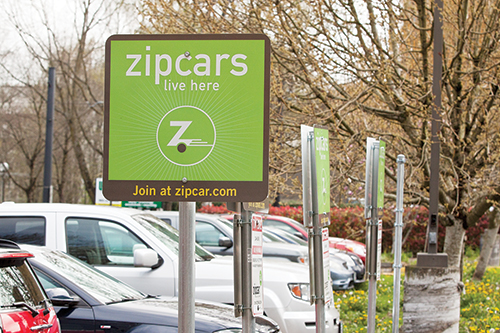
Students and faculty looking for sustainable transportation now have a new option.
Zipcar recently stationed two all-electric Honda Fits on the Portland State campus.
Located in Parking Structure 1 near the Sixth Avenue entrance, the new Fits are available for reservation by Zipcar members who are 21 years of age or older at an hourly rate of $10.50.
According to the company’s website, users can expect to go 45 to 55 miles on a full charge under normal driving conditions. Drivers aren’t on their own, though, should they need to recharge during their reservations.
“We have also partnered with ECOtality’s network of Blink chargers, so that Zipcar members can use a card found in all our EVs to charge up at any Blink station throughout the greater Portland area,” said Jennifer Matthews, a public relations associate at Zipcar.
The charging card operates like a gas card, and Zipcar’s press release concerning the partnership said that the charging stations are capable of fully recharging the Fits “in less than three hours from a low charge indicator illumination point.” Roadside assistance is also available should a user ever become stranded, though the company’s approach to these situations errs on the side of prevention.
“We’ve taken a number of measures to ensure members using our EVs are familiar with driving an electric vehicle,” Matthews said. This includes setting up an informational web page that walks users through the ins and outs of the new electric cars and culminates in a short quiz that users must pass before placing a reservation.
PSU was chosen by Zipcar to house the new EVs “because of the university’s leadership in environmentally conscious innovations, including [PSU’s] Electric Avenue automotive charging stations on campus,” according to a press release.
“Having electric vehicles at PSU through Zipcar fits perfectly with our sustainability mission,” PSU President Wim Wiewel said in a press release. “It’s a clean transportation option that I think our students, faculty and staff are really going to appreciate.”
The university agreed to house the cars on campus because of the fact that “75 percent of faculty, staff and students use alternative means [of transportation] to get to campus,” according to Scott Gallagher, PSU’s communications director.
Alternative transportation, in this case, refers to any means of transportation other than one person driving one car.
“We like to encourage that any way we can,” Gallagher added, through initiatives like the installation of additional bike racks on campus and partnerships with the Portland Streetcar. “Younger people tend to be more willing to adopt that kind of technology.”
“It also helps out students who live on campus,” of which there are about 3,000, Gallagher said, “who occasionally need a vehicle but don’t have a car.”
While Zipcars, according to Matthews, are used for a variety of different reasons, “some of the most common trips are things like a run to Ikea, errands and even job interviews.”
Overall, it’s a good match, according to Gallagher. “It’s good for the students, it’s good for [Zipcar], and it fits into our mission” of developing sustainable processes and practices, he said.

